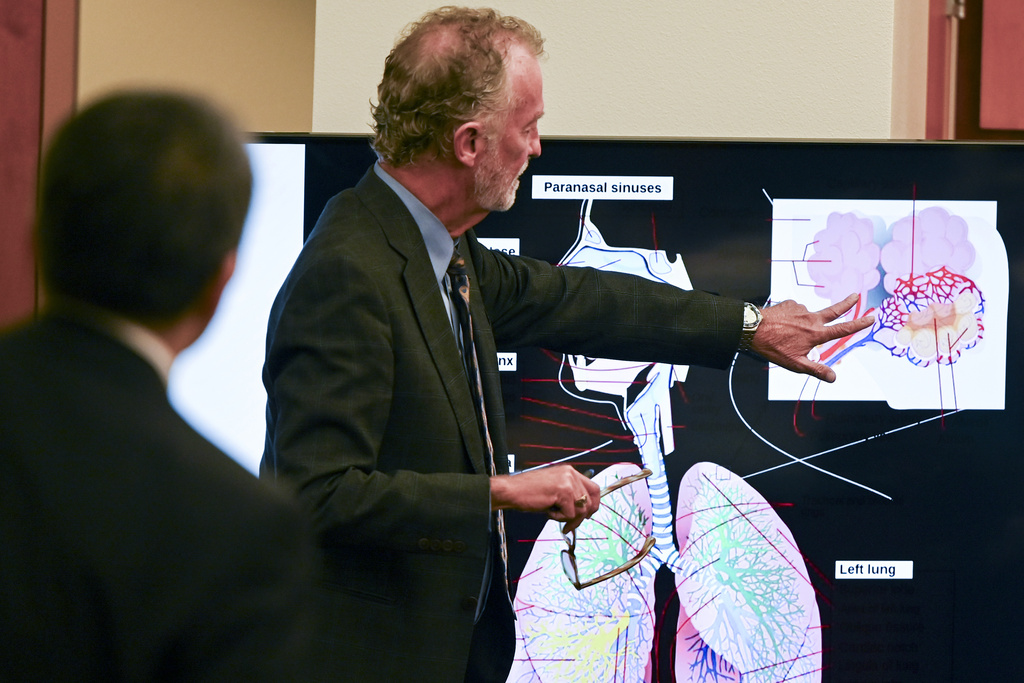TACOMA — Five weeks into the trial of three Tacoma police officers charged in the death of Manny Ellis and prosecutors spent Tuesday morning trying to convince the judge to let their breathing expert tell the jury what happens to a person who is held face down with pressure on their back.
Lawyers for the officers had objected to the testimony of Dr. Curtis Veal, the state’s pulmonology expert, arguing the state already had a cardiologist and forensic pathologist tell the jury about hypoxia and positional asphyxia. Veal’s testimony would just repeat that information and the trial is already weeks behind schedule, they argued.
After hours of testimony and arguments, Judge Bryan Chushcoff agreed to bring the jury in and let Veal take the stand, just before the noon break.
Ellis died March 3, 2020, after repeatedly telling officers he could not breathe while they applied pressure as he lay prone on the pavement. The Pierce County medical examiner ruled Ellis’ death a homicide caused by oxygen deprivation from physical restraint. Lawyers for the officers blame the death on a high level of methamphetamine in Ellis’ system combined with a heart irregularity.
Officers Matthew Collins, 40, Christopher Burbank, 38, and Timothy Rankine, 34, are all on trial for second-degree manslaughter in the case. Collins and Burbank also are charged with second-degree murder. All three have pleaded not guilty, are free on bail and remain on paid leave by the Tacoma Police Department.
Before the jury was brought in, Veal described the distress a person can feel if they’re not able breathe, a condition called “air hunger.”
“When any of us have a sense of shortness of breath, it is extremely distressing to most people,” he said. “It’s a sense that you are smothering.”
After the jury came in, Veal described how that impacted Ellis. He had been involved in physical activity with the officers, had methamphetamine in his system and had been shocked with a Taser, Veal said. Those factors together would increase his oxygen demands. Next came the pressure.
Burbank was sitting on Ellis’ back when Rankine arrived and took over. When medics arrived and took his pulse, it was 80 beats per minute, which suggested that he was suffering from Bradycardia — an abnormally low heart rate, he said. Veal was expected to continue his testimony after the lunch break.
On Monday, a lieutenant with the Pierce County Sheriff’s Office acknowledged that his agency failed to find or collect witness cellphone videos before ending their investigation into Ellis’ death.
The videos and witness statements are critical pieces of evidence in the case. They show Ellis with his hands up in a surrender position as the officers shoot a Taser at his chest and wrap an arm around his neck. The officers later told investigators that Ellis attacked them and was violent, something not shown in the videos or seen by witnesses.
Testimony has been tense at times.
Two weeks ago, a forensic pathologist testified that Ellis likely would have lived if he had not been restrained by the officers. Dr. Roger Mitchell, former chief medical examiner for Washington, D.C., affirmed ex-Pierce County Medical Examiner Dr. Thomas Clark’s ruling that Ellis, a 33-year-old Black man, died by homicide from oxygen deprivation.
“The fight is what killed him,” Mitchell said while being cross-examined by Burbank’s lawyer Brett Purtzer.
“He killed himself by resisting,” Purtzer snapped back. Audible gasps filled the courtroom gallery. Judge Chushcoff instructed the jury to disregard Purtzer’s remark.



